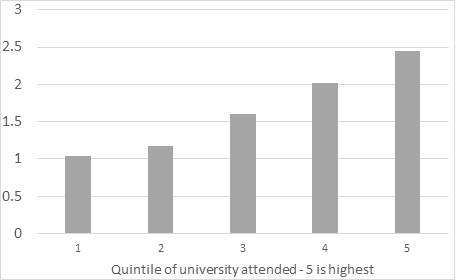By Catherine Dilnot, UCL Institute of Education
As the school exam season gets under way, English 18-year-olds hoping to go to a selective university will typically be taking papers in only three A-level subjects, chosen two years earlier from scores of possible subjects approved nationally, although in practice from the somewhat smaller number offered by their school or 16-18 college. This early specialism in so few subjects can have long-term consequences.
For many UK degree courses particular A-levels will be required – for example biology and chemistry for medicine. But many others don’t have subject pre-requisites, including popular degrees like business and law. So whether a sixteen year old isn’t yet sure what they want to do at university, or has an idea but wants to do a course without pre-requisites, it’s difficult for them to know which subjects to choose. The question then is whether some of the large number of A-level subjects available are more helpful than others in getting them to the university of their choice. Recent reforms have reduced the number of A-level courses approved for teaching in English schools from over 90 to 60, but it is still a bewildering array, both for students choosing, and for schools and colleges deciding what subset to provide.
One important reason that subject choice matters is because we know the sorts of A-levels chosen by 16-year-olds vary by socio-economic background. And while the number of young people going to highly selective university from low SES backgrounds has increased over recent years, UCAS figures for 2017 show that an 18-year-old in the top SES quintile is ten times as likely to attend than someone at the bottom. It’s clear that most of this gap is a result of differential prior attainment, but evidence on whether some subjects are helpful for entry to highly selective university could help chip away at the SES gap.
The Russell Group of 24 research intensive universities publishes an annual guide to A-level choices called ‘Informed Choices’ which describes as facilitating A-level subjects (maths, sciences, languages, humanities) commonly required for their courses. These subjects are more likely to be taken at private and grammar schools than at comprehensive schools and colleges. Are students with these subjects are more likely to be found at more prestigious universities? And if so, is this pattern just because degree courses with more facilitating A-level pre-requisites are found higher up university league tables, or because these subjects are ‘approved of’ by admissions tutors at selective universities?
Figure1: Mean number of facilitating A-levels by quintile of league table score of university attended – students taking at least three A-levels

Using linked administrative data, I examine the 420,000 English school students taking at least three A-levels from 2010 to 2012 who then attend a mainstream UK university. We can see in the figure that A-level subject choices are indeed related to the prestige of university attended, where ‘prestige’ is measured using the Times Good University Guide score – the most well-known of the various league tables in the UK system. Students in quintile five, the most highly ranked universities, are much more likely to have facilitating subjects at A-level than those at lower ranked universities. The relationship persists even when comparing similar students within the same university subject group, suggesting that the relationship is not just an artefact of how degree subjects with facilitating pre-requisites are distributed through the rankings. On average, a student choosing three facilitating subjects rather than none will be at university significantly higher in the league table – say Bristol rather than Leicester, or Oxford Brookes rather than Gloucestershire – than a student with similar prior attainment taking a course from the same subject group. And where one of the facilitating A-levels is maths, the gap is greater still.
Many non-facilitating A-levels have a vocational bent. An aspirational 16-year-old, aiming for a top job in professional services or business might think that a good place to start would be to choose an A-level in say accounting, business or law in order to do a degree in a related subject at a highly ranked university. Most of these courses have no pre-requisites, leaving an open choice of A-levels. My analysis suggests that the relationship between league table score of university attended and having the related A-level subject for accounting, business and law students differs considerably between these subject groups – something 16-year-olds wouldn’t know. Whilst there’s little evidence of an adverse relationship for accounting A-level, and a somewhat larger adverse effect for business A-level, the starkest difference is found for law students: counter-intuitively having law A-level is associated with being at a lower ranked university compared with a similar law student with any other A-level subject instead. This seems particularly unfortunate given that law A-level is overwhelmingly provided at 16-18 colleges, attended on average by less privileged students whilst at private and grammar schools law A-level is rarely taken.
Where a student goes to university is a combination of an application and admission decision –and work using application data when available is needed to refine these findings. And it’s also important to note that performing well in terms of A-level grades is what matters most. But still, when students are choosing their A-levels, taking facilitating subjects, particularly maths, sounds like a sensible approach, even if the degree course they hope to follow has no pre-requisite A-level subjects.
This blog is based on a full-length article published at: https://www.tandfonline.com/doi/full/10.1080/03054985.2018.1409976

